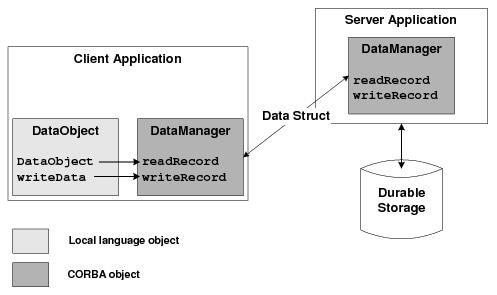4.2 Applicability
This design pattern is appropriate in situations where the CORBA process object needs to pass a large amount of data to the client application for its use. The local language object on the client application becomes a container for the data, and its constructor is used to populate the local object state.
You implement this design pattern in the client application,
which creates a local language object, referred to in this chapter
as the DataObject. The server application implements a
CORBA process object that interacts with entities in persistent
storage. This CORBA object is referred to in this chapter as the
DataManager object.
The OMG IDL for the DataManager CORBA object
defines a data structure that is used for transferring data between
the client and server applications. (This design pattern assumes
"optimistic locking," meaning that the data managed by the server
application is not locked for update, and that it is hoped that no
other server processes modify the data while the client application
uses its local copy.)
When the client application instantiates the local
DataObject, that object’s constructor invokes an
operation on the DataManager CORBA object, which
passes a data structure back to the DataObject. The
DataObject populates its class variables with the
passed data.
If the client application needs to pass modified state back to
the server machine, the client application invokes the
DataObject::writeData() method, which, in turn,
invokes the writeRecord() operation on the
DataManager CORBA object. In this invocation, the data
structure is passed as a parameter to the
writeRecord() operation. The
CORBA object makes the
appropriate updates to durable storage.
DataManager
The following figure illustrates how the CORBA Client Data Caching design pattern works.
Figure 4-1 How the CORBA Client Data Caching design pattern works

In the preceding figure:
- The
DataObjectconstructor invokes thereadRecord()operation on theDataManagerCORBA object, and uses the returned data structure to initialize its local state. - The client application may modify the local state of the
DataObjectinstance. - To pass modified state back to the
DataManagerCORBA object, the client application invokes theDataObject::writeData()operation, passing a data structure containing the modified data.
Parent topic: Client Data Caching Design Pattern